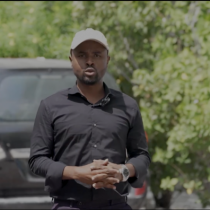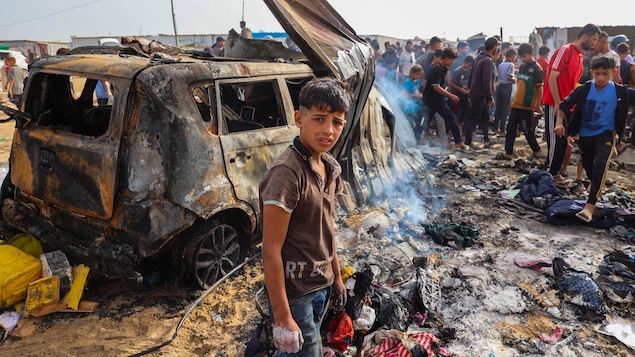




Press freedoms in Israel, Indian-administered Kashmir, Kazakhstan, and Somalia are facing severe threats, leading to different perspectives on the ongoing conflicts in Gaza and the region. In Israel, government restrictions and media self-censorship prevent the realities of the Gaza war from being seen within the country. The Israeli government recently seized The Associated Press's video equipment but quickly returned it due to international condemnation. The Communications Minister cited a law used to temporarily bar Al Jazeera from operating in the country [38bfefb9] [ba603481].
In Indian-administered Kashmir, journalists are facing harassment, intimidation, and digital repression by Indian authorities. Reporters Without Borders has stated that Kashmir has become one of the most perilous regions for journalists, with severe threats including harassment, intimidation, and physical violence. The Modi government has used digital repression as a powerful tool, frequently shutting down the internet to disrupt communication and information flow. Following the abrogation of Article 370 in 2019, the territory experienced its longest internet blackout, lasting seven consecutive months. These shutdowns, curfews, and roadblocks have created barriers for journalists trying to report on the ground [96f0750b].
In Kazakhstan, press freedom rankings have declined, with the country falling from 134th to 142nd in 2024. The country received a score of 41.11 out of 100, indicating a decrease in media freedom. Incidents of violations against correspondents decreased by 20.1% from 434 incidents in 2023 to 141 incidents from January to May 2024. Reports of pre-trial claims or lawsuits against journalists or editorial offices also declined by 5% in 2023. However, censorship issues have worsened according to Reporters Without Borders. The most common violation in Kazakhstan was obstruction of legitimate professional activities, with 51 cases, including six violent ones. Threats to journalists and editorial offices were also significant, with 44 incidents reported [b39ae543].
In Somalia, senior state media journalist Abdulkadir Isse Ali's reporting has been blocked amid rising intimidation and censorship. The Somali Journalists Syndicate (SJS) condemned the restrictions imposed on Ali's reporting on Somali military court activities. The Ministry of Information, under orders from Deputy Minister of Information Abdirahman Yusuf Al-Adaala, blocked a report filed by Ali on a court hearing involving members of the National Intelligence and Security Agency (NISA). Ali's access to government social media accounts was removed, and his access to the Ministry of Information building was restricted. His salary has also been suspended for the past five months. Other journalists at the state media have faced similar intimidation and censorship. These actions against journalists in Somalia are seen as a violation of press freedom and journalists' labor rights [4a7c9316].
The decline in press freedoms in Israel, Indian-administered Kashmir, Kazakhstan, and Somalia has had a significant impact on how the conflicts in Gaza and the region are perceived within these areas. With limited access to independent reporting, many Israelis, Kashmiris, Kazakhstani, and Somalis are only exposed to a narrow range of viewpoints and narratives. This lack of diverse perspectives can shape public opinion and lead to a skewed understanding of the conflicts [38bfefb9] [96f0750b] [b39ae543] [4a7c9316].
The seizure of The Associated Press's video equipment by the Israeli government highlights the increasing restrictions on media coverage in Israel. The equipment was returned following international condemnation, but the incident raises concerns about the government's willingness to suppress independent journalism. The Communications Minister justified the seizure by citing a law that was previously used to temporarily bar Al Jazeera from operating in the country. This law allows the Israeli government to shut down foreign news outlets deemed a security risk [38bfefb9] [ba603481].
The decline in press freedoms and the seizure of The Associated Press's equipment have sparked international concern about the state of media freedom in Israel. The Biden administration has expressed concern over the actions of the Israeli government and emphasized the importance of journalists' rights to do their jobs. The incident also raises questions about the role of the media in conflict zones and the need for independent reporting to provide a comprehensive understanding of the situation on the ground [ba603481].
In Indian-administered Kashmir, journalists face severe threats and obstacles in reporting on the conflicts in the region. The harassment, intimidation, and digital repression by Indian authorities hinder journalists' ability to provide independent and comprehensive coverage. The frequent internet shutdowns further disrupt communication and information flow, making it difficult for journalists to report on the ground and for the public to access reliable news [96f0750b].
The decline in press freedoms in Kazakhstan, along with the censorship issues, has significant implications for media freedom in the country. While there has been a decrease in incidents of violations against correspondents and lawsuits against journalists or editorial offices, the worsening censorship issues raise concerns about the ability of journalists to operate independently and provide accurate information. It is crucial for press freedoms to be protected and for independent journalism to thrive in Kazakhstan in order to promote transparency, accountability, and a more nuanced understanding of the conflicts [b39ae543].
The restrictions on press freedoms in Somalia, particularly the blocking of senior state media journalist Abdulkadir Isse Ali's reporting, are a violation of press freedom and journalists' labor rights. The actions taken against Ali, including the removal of his access to government social media accounts, the restriction of his access to the Ministry of Information building, and the suspension of his salary, hinder his ability to report on Somali military court activities. Other journalists at the state media have also faced similar intimidation and censorship. These actions limit the flow of information and prevent a comprehensive understanding of the situation in Somalia [4a7c9316].
The decline in press freedoms in Israel, Indian-administered Kashmir, Kazakhstan, and Somalia, along with the restrictions on media coverage of the conflicts, have significant implications for how the conflicts are perceived within these regions. The lack of diverse perspectives and independent reporting can shape public opinion and hinder a comprehensive understanding of the situations. It is crucial for press freedoms to be protected and for independent journalism to thrive in all four regions in order to promote transparency, accountability, and a more nuanced understanding of the conflicts [38bfefb9] [96f0750b] [b39ae543] [4a7c9316].